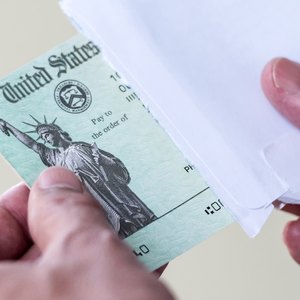
If you want to direct deposit your tax refund check into someone else's account, you may find out that it isn't always possible. Banks have the right to refuse any check, including one you give to a friend or relative. However, if it's properly endorsed, you shouldn't have too many problems. It's always wise to contact your relative's bank first, either in person or over the phone, to ensure that it will accept the check.
Tips
Depending on your relative's bank's policy, you may be able to deposit your tax refund check into her account. It is best to check with the bank first, however.
Endorsing a Check
Before depositing the paper check for your tax return, you must first sign the back to endorse it. This applies to any paper check you receive, with the exception of those marked "for deposit only," which can only be deposited in your own bank account. In most cases, you can simply sign your name on the back of the check.
After you endorse the check, your friend or relative should endorse the check too by signing his name below yours. To avoid problems – like having officials at the bank wondering if the check has been stolen or not – you may want to do this together in front of a bank teller. Bring photo ID in case the teller asks you to prove that the check is yours.
Using a Special Endorsement
Simply signing your name on the back of a check could, in fact, transform it into a blank check that could be used by anyone who has it. If you can't go with your relative to the bank, use a special endorsement to ensure that only your relative can deposit it. To do this, write "pay to the order of" on the back of the check, followed by your relative's name, and then sign your name below her name.
Depositing the Check Yourself
Provided you have your relative's full name and full account number, you can go to his bank yourself and deposit the check. Anyone can deposit money into a bank account – although withdrawing money is not an option. You should not sign the back of the check until you are in front of the teller. If the check is already signed, you may be asked to sign it again.
Going to an ATM to deposit a check could be an option, provided you know your relative's bank card PIN number. For example, if your relative has given you power of attorney to do his banking, you may be allowed to access his bank account with an ATM. However, in most cases your relative should deposit it himself.
Depositing Checks Into Your Account
If you are planning to use a relative's bank account to deposit a check because you're concerned about the bank putting a hold on checks deposited into your own account, contact your bank to ask about its policy on government checks. Unlike personal checks or payroll checks, banks will often make the funds available much more quickly when a government check is being deposited.
If you go to the bank in person, rather than using an ATM, the bank may make the funds available for withdrawal no later than the next business day. You may be asked to use a special deposit slip for government-issued checks to ensure the funds are released quickly.
On the other hand, if you go to an ATM, you may have to wait a few extra days. as it takes time for the check to be collected from the ATM, delivered to your bank and then processed.
Using IRS Direct Deposit
Anyone who wants to get a tax refund as quickly as possible should consider opting for direct deposit with the IRS. Money can be deposited into a checking, savings or retirement account. You can even elect to have the refund split up and deposited into three different accounts. To do this, fill out IRS Form 8888 and specify into which accounts you want the money deposited.
Read More: The Federal Gift Tax and Holiday Giving
References
- HelpWithMyBank.gov: Answers about Funds Availability
- IRS: Refund Information
- IRS: Form 888: Allocation of Refund (Including Savings Bond Purchases)
- The Balance: How to Endorse Checks, Plus When and How to Sign
- U.S. News: Endorsing a Check the Right Way at the Right Time
- Credit Karma: How to Deposit a Check
- Wells Fargo. "Wells Fargo Mobile Deposit." Accessed April 17, 2020.
- Bank of America. "Mobile Check Deposit." Accessed April 17, 2020.
- U.S. Bank. "Your Deposit Account Agreement," Page 17. Accessed April 17, 2020.
- Sound Credit Union. "Shared Branching: Making It Easy to Access Your Account." Accessed April 17, 2020.
- Capital One. "Can I Deposit a Check at an ATM?" Accessed April 17, 2020.
- HSBC. "FAQs, Forms, and Helpful Materials." Accessed April 17, 2020.
- Credit Union National Association. "Check Endorsement Training Guide." Accessed April 17, 2020.
- First Bank Financial Centre. "How To: Fill Out a Deposit Slip." Accessed April 17, 2020.
- Federal Deposit Insurance Corporation. "Consumer Compliance Examination Manual: Expedited Funds Availability Act," Page 6. Accessed April 17, 2020.
- HelpWithMyBank.gov. "Answers About Funds Availability." Accessed April 17, 2020.
- FTC Consumer Information. "Don't Bank on That Check." Accessed April 17, 2020.
- HelpWithMyBank.gov. "Answers About Forgery and Fraud." Accessed April 17, 2020.
- FDIC. "Have You Bounced Yourself Out of a Checking Account?" Accessed April 17, 2020.
- Walmart. "Check & Card Cashing." Accessed April 17, 2020.
Writer Bio
A published author and professional speaker, David Weedmark has worked as a technology consultant for many small businesses and was once a professional financial advisor. David has also has written hundreds of articles on money matters for newspapers, magazines and online publications.

